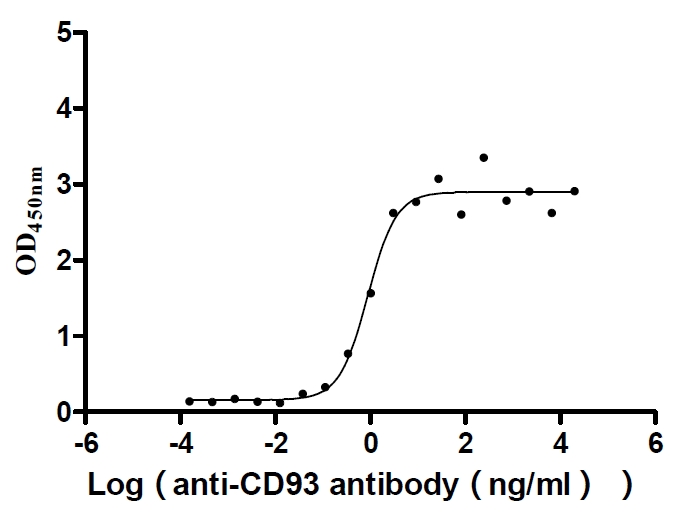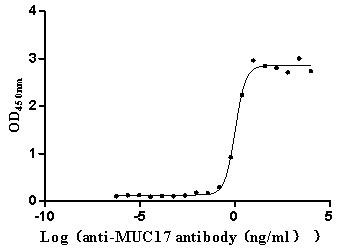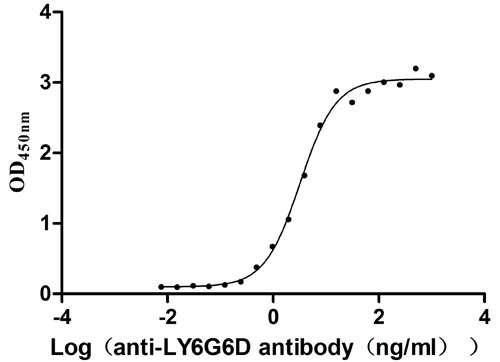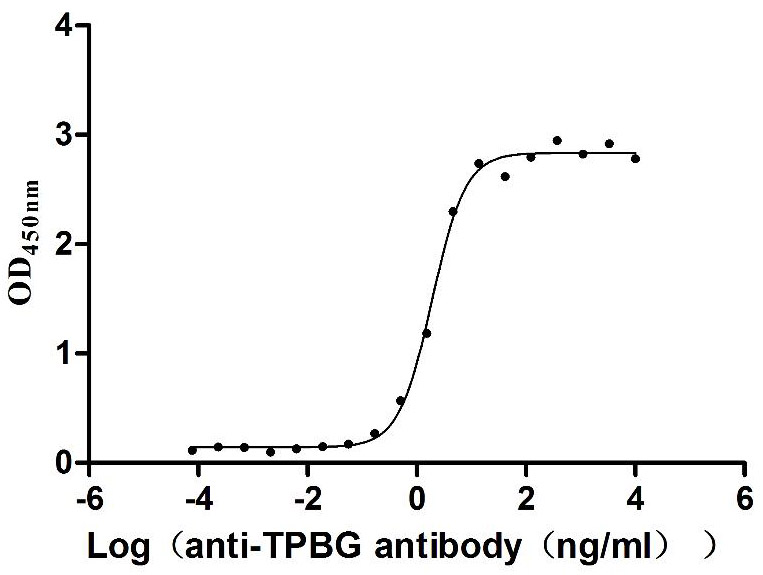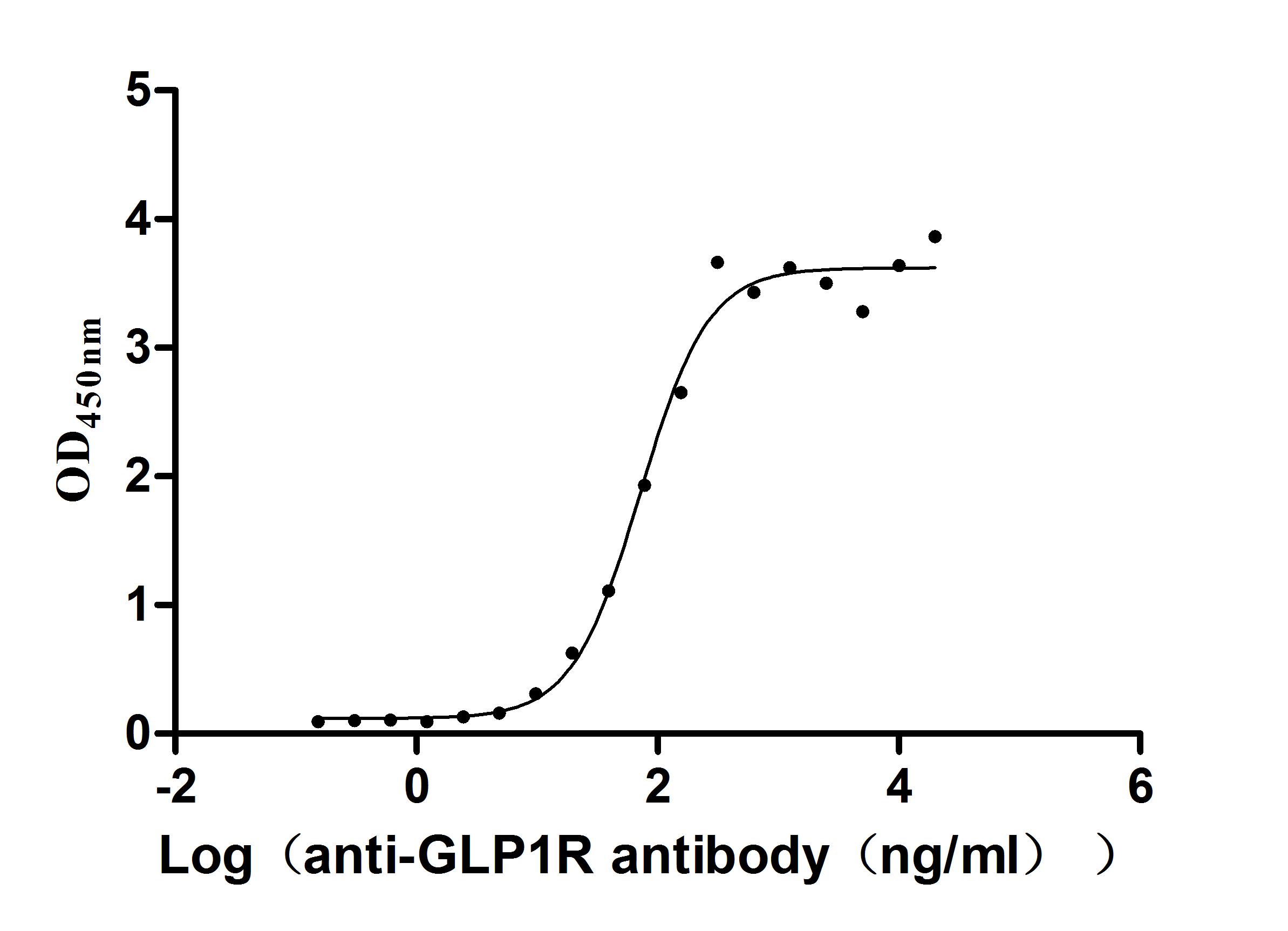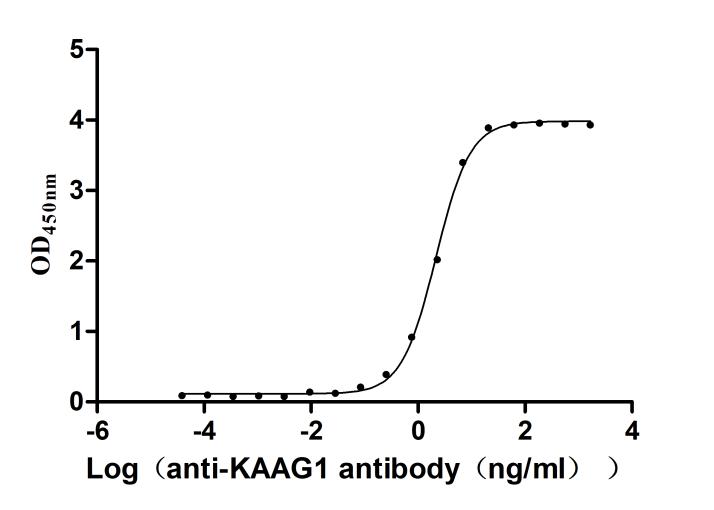-
中文名稱:小鼠Srgn重組蛋白
-
貨號:CSB-EP022664MO
-
說明書:
-
規格:¥1836
-
圖片:
-
其他:
產品詳情
-
純度:Greater than 90% as determined by SDS-PAGE.
-
基因名:Srgn
-
Uniprot No.:
-
種屬:Mus musculus (Mouse)
-
蛋白長度:Full Length of Mature Protein
-
來源:E.coli
-
分子量:15.3 kDa
-
表達區域:75-152aa
-
氨基酸序列EGPSKDFISNYDDYGSGSGSGSGSGSGSGSGSGSGFLGDMEWEYQPTDESNIVYFNYKPFDRILTEQNQDQPEDDFII
Note: The complete sequence may include tag sequence, target protein sequence, linker sequence and extra sequence that is translated with the protein sequence for the purpose(s) of secretion, stability, solubility, etc.
If the exact amino acid sequence of this recombinant protein is critical to your application, please explicitly request the full and complete sequence of this protein before ordering. -
蛋白標簽:C-terminal 6xHis-tagged
-
產品提供形式:Liquid or Lyophilized powder Warning: in_array() expects parameter 2 to be array, null given in /www/web/cusabio_cn/public_html/caches/caches_template/default/content/show_product_protein.php on line 662
Note: We will preferentially ship the format that we have in stock, however, if you have any special requirement for the format, please remark your requirement when placing the order, we will prepare according to your demand. -
緩沖液:If the delivery form is liquid, the default storage buffer is Tris/PBS-based buffer, 5%-50% glycerol. If the delivery form is lyophilized powder, the buffer before lyophilization is Tris/PBS-based buffer, 6% Trehalose.
-
復溶:We recommend that this vial be briefly centrifuged prior to opening to bring the contents to the bottom. Please reconstitute protein in deionized sterile water to a concentration of 0.1-1.0 mg/mL.We recommend to add 5-50% of glycerol (final concentration) and aliquot for long-term storage at -20℃/-80℃. Our default final concentration of glycerol is 50%. Customers could use it as reference.
-
儲存條件:Store at -20°C/-80°C upon receipt, aliquoting is necessary for mutiple use. Avoid repeated freeze-thaw cycles.
-
保質期:The shelf life is related to many factors, storage state, buffer ingredients, storage temperature and the stability of the protein itself.
Generally, the shelf life of liquid form is 6 months at -20°C/-80°C. The shelf life of lyophilized form is 12 months at -20°C/-80°C. -
貨期:3-7 business days
-
注意事項:Repeated freezing and thawing is not recommended. Store working aliquots at 4°C for up to one week.
-
Datasheet & COA:Please contact us to get it.
引用文獻
- SRGN amplifies microglia-mediated neuroinflammation and exacerbates ischemic brain injury T Tong,Journal of neuroinflammation,2024
相關產品
靶點詳情
-
功能:Plays a role in formation of mast cell secretory granules and mediates storage of various compounds in secretory vesicles. Required for storage of some proteases in both connective tissue and mucosal mast cells and for storage of granzyme B in T-lymphocytes. Plays a role in localizing neutrophil elastase in azurophil granules of neutrophils. Mediates processing of MMP2. Plays a role in cytotoxic cell granule-mediated apoptosis by forming a complex with granzyme B which is delivered to cells by perforin to induce apoptosis. Regulates the secretion of TNF-alpha and may also regulate protease secretion. Inhibits bone mineralization.
-
基因功能參考文獻:
- serglycin produced in lipopolysaccharide-induced inflammation in normal mouse chondrocytes is able to modulate inflammation by interacting with CD44 receptor, suggesting a possible key role in the cartilage inflammation. PMID: 29588174
- Findings indicate that PRG-1 deficiency led to over-excitability caused by an altered LPA/LPA2-R signaling inducing a behavioral phenotype typically observed in animal models for psychiatric disorders. PMID: 28843862
- this study shows that the serglycin-deficient mice are more susceptible to Trichinella spiralis infection and display an unbalanced immune response PMID: 27267469
- Data suggest that serglycin proteoglycans play a role in extravasation as well as colonization and growth of metastatic cells. PMID: 27223472
- serglycin deficient mice exhibited elevated concentrations of serum LDL after feeding high-fat diet for 20 weeks. PMID: 26391682
- Dopamine storage increased during mast cell maturation from bone marrow precursors, and was dependent on the presence of serglycin. PMID: 22628305
- Cells lacking mouse mast cell protease 6 exhibited similar defects in apoptosis as observed in serglycin(-/-) cells, indicating that the pro-apoptotic function of serglycin is due to downstream effects of proteases that are complex-bound to serglycin PMID: 22493512
- The PRG-1 transcription is initiated at multiple transcription start site and no influence on expression in vivo by Nex1 deficiency. PMID: 21805347
- serglycin proteoglycan as a novel player in mast cell apoptosis. PMID: 21123167
- serglycin proteoglycan is dispensable for normal secretion and activity of mast cell proteases in response to peritoneal infection with T. gondii. PMID: 20864536
- SG proteoglycan has a key role in mast cell function PMID: 15231821
- serglycin is the major proteoglycan secreted by peritoneal macrophages and the macrophage serglycin may have a role in regulating secretion of tumor necrosis factor-alpha PMID: 16807245
- The reduced amounts of proteases in the absence of serglycin is not caused by missorting, but rather that serglycin may be involved in the retention of the proteases after their entry into secretory vesicles PMID: 17010166
- Serglycin is of crucial importance for assembly of mature mucosal mast cell granules, but the specific dependence on SG for storage varies between individual granule constituents. PMID: 17147513
- Neutrophil elastase depends on serglycin proteoglycan for localization in granules. PMID: 17272511
- SG is crucial for platelet function and thrombus formation PMID: 18094327
- Histamine and serotonin storage in mast cells is dependent on serglycin proteoglycan. PMID: 18234316
- the present report points to a novel, previously unrecognized role for serglycin proteoglycan in regulating the kinetics of antiviral CD8(+) T cell responses PMID: 18606656
- These findings are thus in accordance with a role for the N-terminal disulfide motif in serglycin for regulation of mast cell secretory granule integrity. PMID: 19059647
- SGC deficiency causes multiple, age-related effects on the lymphoid system PMID: 19088175
- mast cell maturation is associated with the expression of a distinct signature of genes involved in serglycin proteoglycan synthesis, and that mast cell activation modulates their expression. PMID: 19915053
顯示更多
收起更多
-
亞細胞定位:Cytoplasmic granule. Cytolytic granule. Secreted, extracellular space. Golgi apparatus.
-
蛋白家族:Serglycin family
-
數據庫鏈接:
Most popular with customers
-
Recombinant Human Plexin-B1 (PLXNB1), partial (Active)
Express system: Mammalian cell
Species: Homo sapiens (Human)
-
Recombinant Mouse Claudin-18.2 (Cldn18.2)-VLPs (Active)
Express system: Mammalian cell
Species: Mus musculus (Mouse)
-
Recombinant Human Complement component C1q receptor (CD93), partial (Active)
Express system: Mammalian cell
Species: Homo sapiens (Human)
-
Recombinant Human Mucin-17 (MUC17), partial (Active)
Express system: Mammalian cell
Species: Homo sapiens (Human)
-
Recombinant Human Lymphocyte antigen 6 complex locus protein G6d (LY6G6D) (Active)
Express system: Yeast
Species: Homo sapiens (Human)
-
Recombinant Macaca fascicularis Trophoblast glycoprotein (TPBG), partial (Active)
Express system: Mammalian cell
Species: Macaca fascicularis (Crab-eating macaque) (Cynomolgus monkey)
-
Recombinant Human Glucagon-like peptide 1 receptor (GLP1R), partial (Active)
Express system: Mammalian cell
Species: Homo sapiens (Human)
-
Recombinant Human Kidney-associated antigen 1 (KAAG1) (Active)
Express system: E.coli
Species: Homo sapiens (Human)

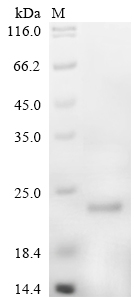

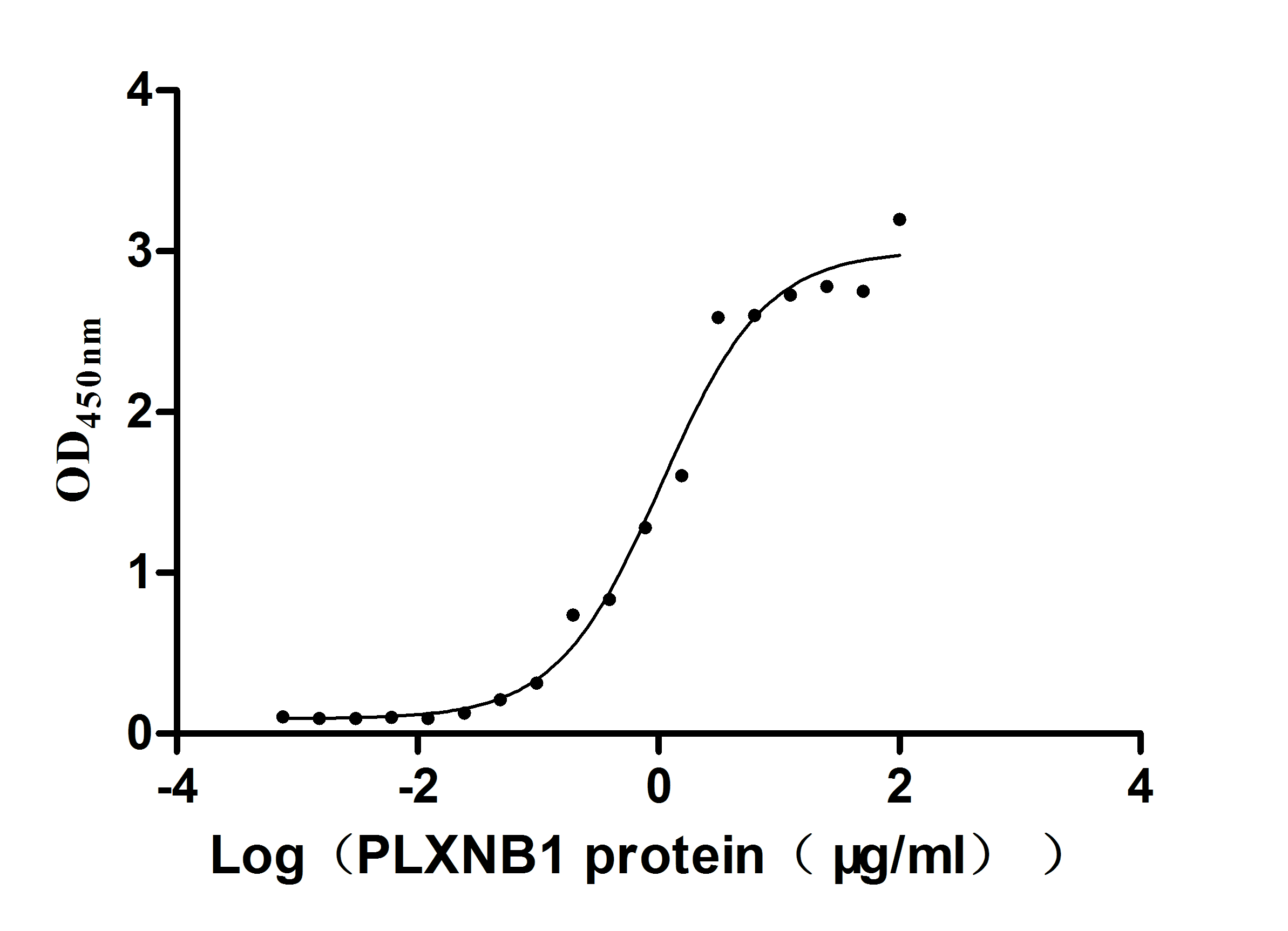
-AC1.jpg)
